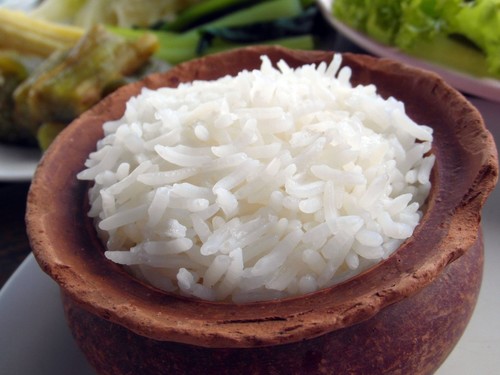Short answer
Rice, in itself, is not bad for you and can be a healthy part of your diet when consumed in moderation. The type of rice matters; brown rice, with its higher fiber and nutrient content, offers more health benefits compared to white rice. White rice, being more processed, lacks these additional nutrients but can still be part of a balanced diet. It's important to consider rice within the context of your overall dietary patterns, ensuring it's balanced with other nutrient-rich foods. Moderation, variety, and balanced pairing with other foods are key to including rice in a healthy diet.
Recommended Alternative
Long answer
Rice, a staple food for more than half of the world's population, is a cornerstone in many diets. But with the growing concerns about health and nutrition, many are asking: Is rice bad for you? Let's unravel this question by examining various aspects of rice and its impact on health.
Nutritional Profile of Rice
Rice, primarily composed of carbohydrates, also contains protein and minimal fat. It's a good source of energy and, in its whole grain form (brown rice), is rich in fiber, vitamins, and minerals like manganese, selenium, and magnesium. White rice, on the other hand, is more processed, stripping away much of these nutrients.
Types of Rice and Their Effects
-
Brown Rice: This whole grain variant is a nutritional powerhouse. High in fiber, it aids in digestion and provides a sense of fullness, which can be beneficial for weight management.
-
White Rice: More refined, it lacks the fiber and essential nutrients found in brown rice. However, it's often enriched with vitamins and minerals to compensate for this loss.
-
Basmati, Jasmine, and Others: Specialty rices vary in their nutritional content. Basmati rice, for instance, has a lower glycemic index compared to other white rices.
Glycemic Index and Diabetes
The glycemic index (GI) is a measure of how quickly foods raise blood sugar levels. White rice has a higher GI, which can lead to spikes in blood sugar levels, making it a concern for individuals with diabetes or insulin resistance. Brown rice, with its lower GI, is a better option in this context.
Weight Management
The debate around rice and weight management is nuanced. While rice is calorie-dense, it can be part of a balanced diet. Portion control is key here. Excessive consumption of any food, including rice, can lead to weight gain.
Arsenic in Rice
A point of concern with rice is its arsenic content, a toxic substance found in soil and water. Brown rice tends to absorb more arsenic than white rice. However, proper cooking techniques, like washing and using more water, can reduce its levels.
Digestive Health
For those with digestive issues, white rice may be easier to digest due to its lower fiber content. However, for others, the high fiber in brown rice can promote digestive health and prevent constipation.
Heart Health
Brown rice's fiber, along with its nutrient profile, can contribute to heart health by reducing cholesterol levels. White rice, lacking these nutrients, doesn't offer the same benefits.
Rice in Different Diets
-
Gluten-Free Diets: Rice is naturally gluten-free, making it a great option for those with celiac disease or gluten sensitivity.
-
Plant-Based Diets: For vegetarians and vegans, rice can be a staple carbohydrate source, pairing well with legumes to form a complete protein.
Cultural and Culinary Aspects
Rice is more than just a food; it's a cultural symbol. In many cuisines, it's celebrated for its versatility and ability to complement various dishes. This cultural significance should also be considered when discussing its health impacts.
Moderation and Balance
Like with most foods, moderation is key. Incorporating rice into a balanced diet, filled with a variety of other nutrient-rich foods, can mitigate some of the health concerns associated with its consumption.
Conclusion
So, is rice bad for you? The answer is not straightforward. It depends on the type of rice, the way it's prepared, and the overall dietary pattern. Brown rice offers more nutritional benefits compared to white rice, but even white rice can have a place in a balanced diet. Understanding your personal health needs and dietary preferences is crucial in determining how rice fits into your diet.
Rice, in its many forms, can be both a nutritious component of a meal and a cultural staple. Its impact on health varies based on individual dietary needs and lifestyle choices. As with any food, it's the overall dietary pattern that matters most. So, enjoy your rice, but remember to do so as part of a diverse and balanced diet.
Possible short-term side effects
- blood sugar spike (white rice)
- digestive discomfort (excessive intake)
Possible long-term side effects
- weight gain (overconsumption)
- nutrient deficiencies (relying solely on white rice)
- increased diabetes risk (excessive white rice consumption)
Ingredients to be aware of
- arsenic traces
- high glycemic index (white rice)

Benefits
- energy source
- rich in vitamins (brown rice)
- high in fiber (brown rice)
- good for digestion
- blood sugar control (brown rice)
Healthier alternatives
Our Wellness Pick (what is this?)
Lundberg Short Grain Rice
- Organic quality
- Whole grain nutrition
- Family farm grown
- Non-GMO
- Gluten-free
 Approved by
Approved by 















